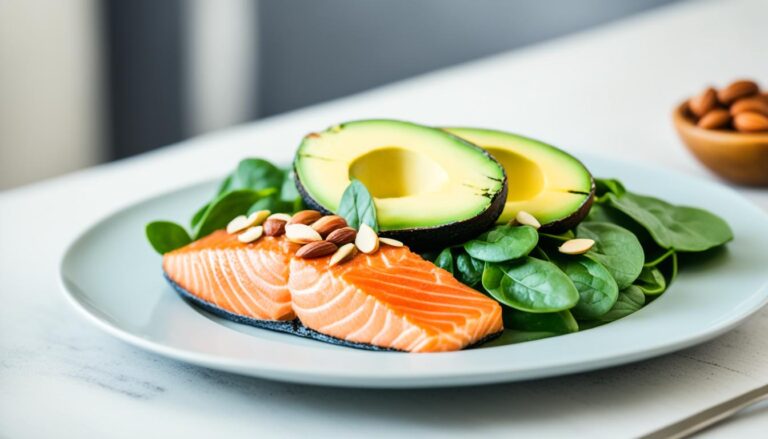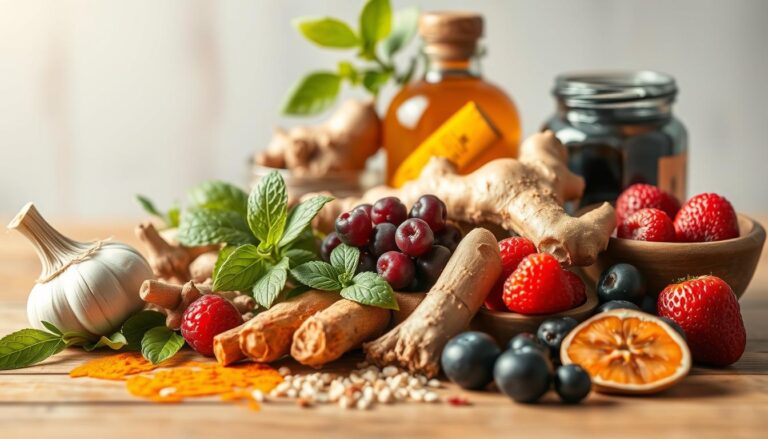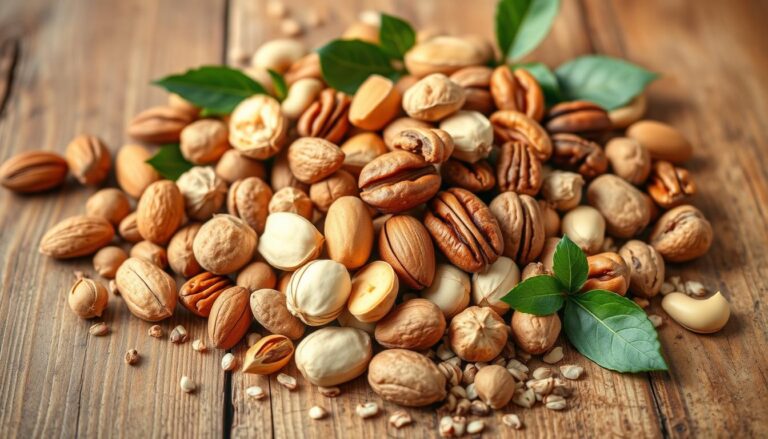Have you ever thought about why cucumbers are more than just tasty in salads? These little veggies are packed with unique antioxidants.
They have many different compounds that help keep you healthy. Cucumbers have everything from bold flavonoids to secret cucurbitacins, making them a nutritional treasure. Let’s explore why these veggies stand out thanks to their essential antioxidants.
Key Takeaways
- Cucumbers are rich in diverse antioxidants such as flavonoids, lignans, and cucurbitacins.
- These antioxidants are important for fighting oxidative stress and inflammation.
- Cucumbers also have vitamins, minerals, and phytonutrients that benefit health.
- The dietary fiber and polyphenols in cucumbers help with gut health and well-being.
- Adding cucumbers to your meals can boost your body’s antioxidant defenses.
The Humble Cucumber Nature’s Secret Weapon
Cucumbers might look simple, but they’re full of essential nutrients. They are not just water and crunch. Cucumbers help keep us hydrated and provide vitamins, minerals, and healthy plant compounds. These make them more than a salad staple.
Unraveling the Nutritional Powerhouse
Cucumbers offer a lot for our health. They pack vitamins C, K, and B5, and minerals like manganese and molybdenum. Their phytonutrients bring flavonoids, lignans, and cucurbitacins. These help fight inflammation and work as antioxidants.
Surprising Benefits Beyond Hydration
Cucumbers are more than water for us. They are great for fiber, which helps our gut and keeps us regular. Their special plant compounds support healthy skin fight inflammation, and might help prevent cancer. So, cucumbers do a lot more than just hydrate.
Take a closer look at how these everyday veggies can do wonders for our health. Their benefits are more than meets the eye.
Cucumbers are not just for hydration they are a true nutritional powerhouse offering a wide range of essential vitamins, minerals, and phytonutrients that can support overall health and well being.
Flavonoids The Colorful Defenders
Cucumbers are packed with antioxidants, with flavonoids taking the front stage. Flavonoids give cucumbers their bright colors. They also fight off free radicals, which damage cells.
Flavonoids are a type of polyphenols famous for their antioxidant power. They stop free radicals and the enzymes that make them. This protection helps our heart, brain, and immune system stay healthy.
The amount of flavonoids in cucumbers changes based on how they are grown. But, these compounds always add to cucumbers’ health benefits. They are key to eating antioxidant-rich foods.
Incorporating cucumbers into your daily routine is an effortless way to harness the power of flavonoids and support your body’s natural defenses against oxidative stress.
Now we see how important flavonoids in cucumbers are. Eating this veggie raw pickled, or in drinks is smart. It gives our bodies a tasty mix of nutrients.
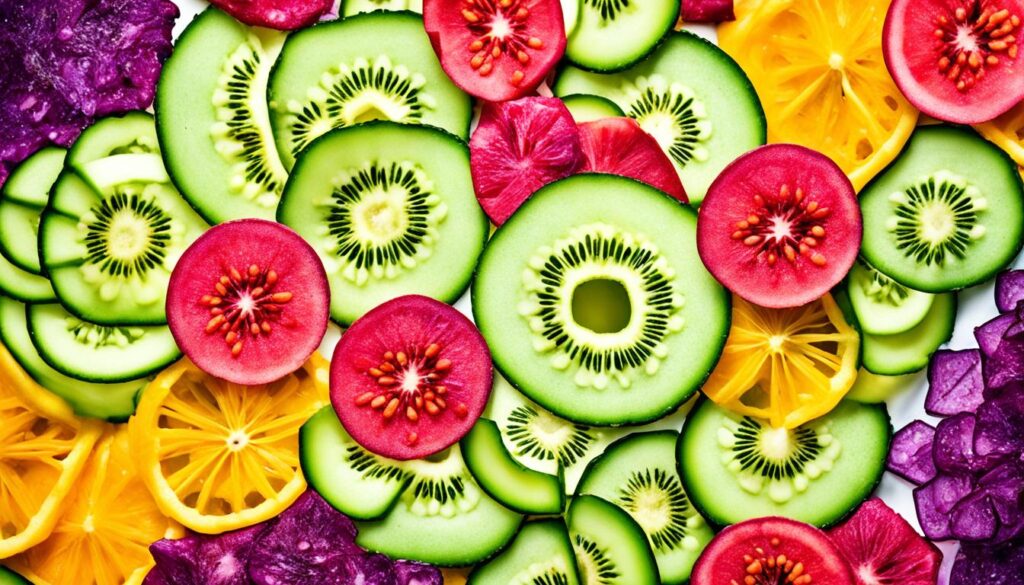
Cucumbers contain a unique array of antioxidants including flavonoids lignans,
Cucumbers are more than just water rich and refreshing. They also hold a treasure trove of special antioxidants. With rich flavonoids and many other good-for-you plant compounds, they stand out.
Exploring the Role of Lignans
Lignans are special nutrients in cucumbers that fight inflammation, cancer, and protect the heart. They work as antioxidants, fighting off harmful free radicals and reducing body stress.
Cucumbers top the charts as rich sources of lignans, more than many fruits and veggies. Adding them to your meals boosts antioxidants in your diet.
| Antioxidant | Health Benefits |
|---|---|
| Flavonoids | Anti-inflammatory, anti-cancer, and cardiovascular-protective properties |
| Lignans | Anti-inflammatory, anti-cancer, and heart-protective properties |
| Phytonutrients | Diverse range of beneficial plant compounds with antioxidant and health-promoting effects |
Learning about lignans in cucumbers sheds light on even more health advantages. Making cucumbers a part of your diet is a smart move for these strong, unique antioxidants.
Cucurbitacins The Bitter yet Beneficial Compounds
Cucumbers are loved for their crunch and water content, and they hide something special inside. This is their cucurbitacin content, giving them a bitter taste. But these compounds are packed with antioxidant and anti-inflammatory abilities. They help boost our health in surprising ways.
Cucurbitacins are a kind of triterpene found mostly in cucumber plants and others like them. They protect the plant from bugs with their bitter taste. For those looking to improve their health, this bitterness is a sign of hidden benefits.
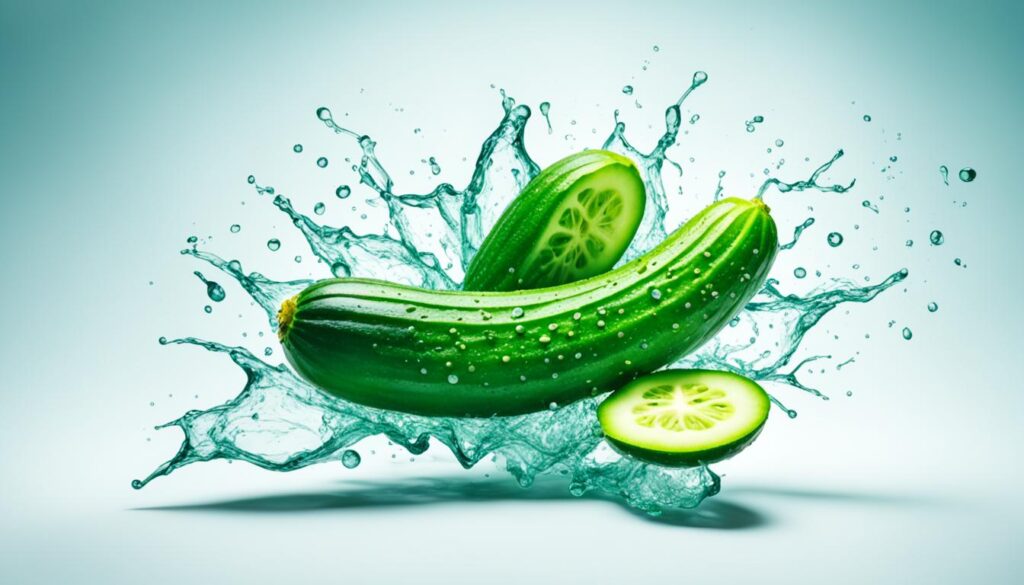
Studies show cucurbitacins are strong antioxidants. They fight off harmful free radicals, lessening stress on our bodies. These compounds can also help ease inflammation. This is good news for those with inflammatory health issues.
Cucurbitacins have been found to exhibit a wide range of pharmacological activities, including anti-inflammatory, anti-cancer and neuroprotective effects.
Learning about cucurbitacins shows us the extra value of cucumbers. Beyond just being tasty and hydrating they can help manage oxidative stress and inflammation. This supports our overall health.
Seeing the power in cucurbitacins reveals the amazing benefits of cucumbers. They enrich our diet with various phytochemicals for a healthier life.
Cucumisins The Unsung Heroes of Cucumber’s Antioxidant Army
Cucumbers are famous for being full of water and cool to eat. But, their real strength is in the special plant chemicals that make them a great source of antioxidants. Among these are cucumisins and apogenins not as well-known but very important.
Unveiling the Mysteries of Apogenins
Apogenins are a special kind of compound found in cucumbers. They’re known to be very strong antioxidants. These natural chemicals help fight off harmful particles, protect our cells, and keep us healthy.
The amount of apogenins in cucumbers can be quite different. It depends on factors like how they’re grown and the kind of cucumber it is. This difference shows why it’s good to know about these unique parts of cucumbers.
| Compound | Function | Concentration in Cucumbers |
|---|---|---|
| Apogenins | Powerful antioxidants that neutralize free radicals and support cellular health | Varies depending on cultivar and growing conditions |
| Cucumisins | Unique phytochemicals that contribute to the overall antioxidant profile of cucumbers | Relatively high in most cucumber varieties |
Among these, cucumisins are also crucial for cucumber’s antioxidant power. Working together with other antioxidants, they form a strong shield against damage by free radicals and stress.
Cucumbers are more than just a refreshing vegetable they are a veritable treasure trove of beneficial phytochemicals, including the lesser-known but equally important cucumisins and apogenins.
Understanding these special parts of cucumbers gives us a greater view of their health benefits. It helps us see how cucumbers are really a powerhouse of good stuff for our bodies.
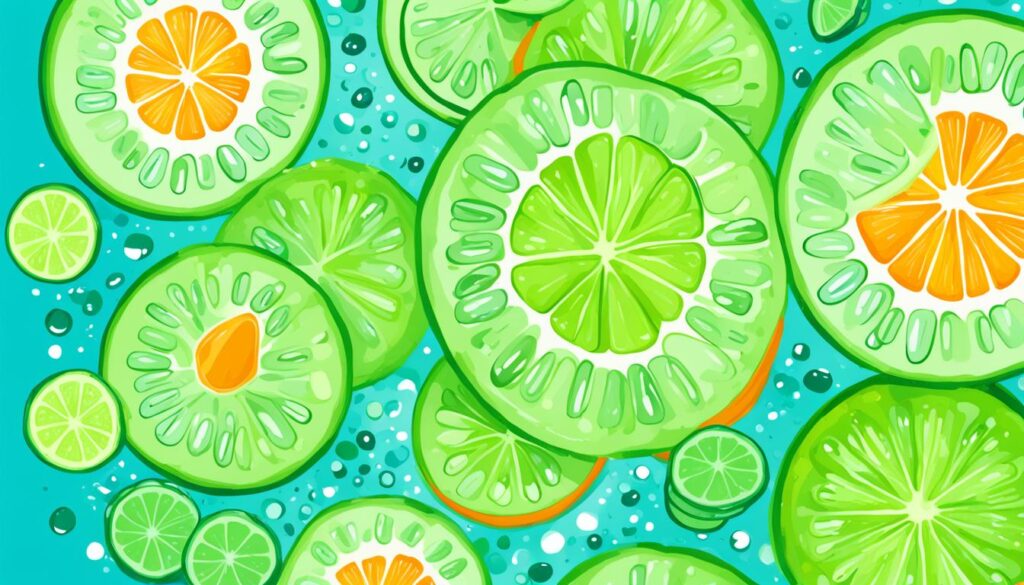
Vitamin C and K The Dynamic Duo
Cucumbers shine as a top source for vitamins C and K. These vitamins work together to boost our body’s vital functions. Because of this, cucumbers are truly a superfood.
Beta Carotene and Zeaxanthin Nature’s Sunscreen
Cucumbers are not just rich in vitamins, they also have antioxidants like beta-carotene and zeaxanthin. These antioxidants act as a natural shield against UV rays. This helps protect our skin and cells from damage caused by the sun.
Vitamin C fights off harmful free radicals and boosts the immune system. Meanwhile, vitamin K is key for clotting blood and keeping our bones strong. Together, vitamins C and K improve our health in many ways.
Eating cucumbers is an easy way to get more of these vital nutrients and antioxidants. You can add them to salads, drinks, or enjoy as is. Cucumbers are a tasty, nutritious part of a balanced diet.
| Nutrient | Benefits |
|---|---|
| Vitamin C | Powerful antioxidant, supports immune system |
| Vitamin K | Crucial for blood clotting and bone health |
| Beta Carotene | Acts as a natural sunscreen, protects cells from UV damage |
| Zeaxanthin | Shields eyes from harmful blue light, supports vision health |
Cucumbers are packed with essential nutrients and special antioxidants. They are a vital part of a healthy diet. Vitamins C and K, along with beta carotene and zeaxanthin make cucumbers a key food for health.
Manganese and Molybdenum The Trace Element Titans
Cucumbers are loaded with beneficial nutrients, including trace elements like manganese and molybdenum. Even though they’re not often talked about, these two are essential for maintaining our health. They do a lot of important work in our bodies.
Manganese is crucial for many enzymes that protect us from antioxidant damage and help make energy. It fights off harmful free radicals, keeping our cells healthy. On the other hand, molybdenum helps process proteins and remove toxins, helping us detox.
Although we need them in small amounts, manganese and molybdenum play big roles. They’re like unsung heroes making sure our body’s systems run smoothly. Eating more cucumbers can help us benefit from their functions, boosting our health.
| Nutrient | Benefits | Food Sources |
|---|---|---|
| Manganese |
|
|
| Molybdenum |
|
|
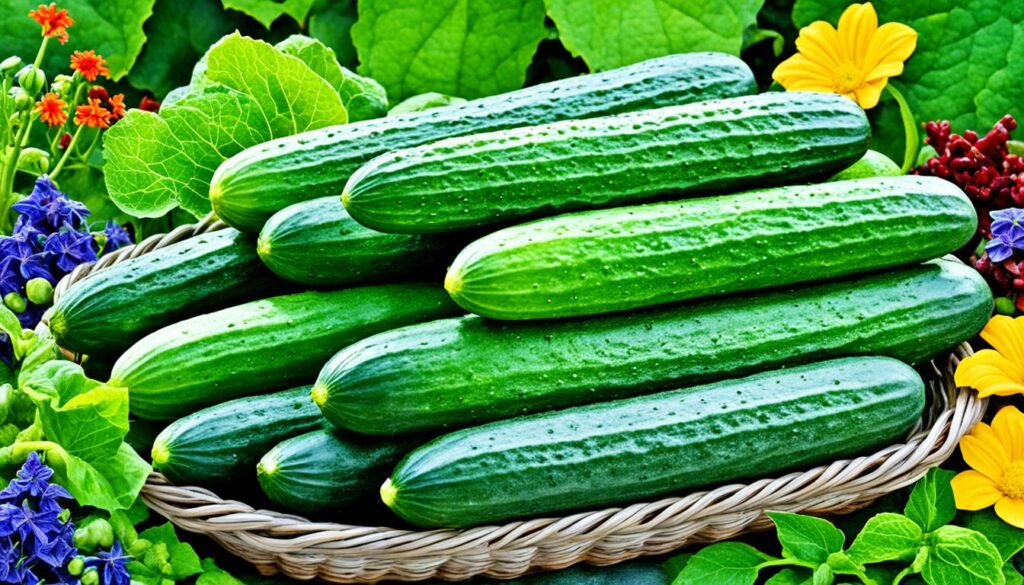
Many don’t realize how important manganese and molybdenum are, but they’re critical for our health. Cucumbers are a great, natural way to get these essential elements our body craves.
Triterpene Compounds The Understudied Marvels
Cucumbers aren’t just water-filled snacks. They’re rich in triterpene compounds. These compounds shine with their strong ability to fight oxidation and reduce inflammation.
Unlocking the Potential of Phytochemicals
Beneath the skin of cucumbers, a wealth of phytochemicals is waiting. These include the special triterpene compounds. Scientists are focusing more on them in recent studies.
These compounds in cucumbers bring a bag of benefits, such as:
- Fighting off free radicals and cell damage with strong antioxidant power
- Helping calm inflammation in the body
- Showing potential against cancer by affecting how cells behave
Learning about these unique food elements could open new doors. As we dive deeper, we might be surprised by how much cucumbers can do for our health.
Cucumbers are not just a refreshing vegetable they are a treasure trove of phytochemicals with untapped potential.
Dietary Fiber The Unsung Hero of Gut Health
Cucumbers are famous for being refreshing and full of nutrients. Did you know they’re also rich in dietary fiber? This fiber is key to gut health, helping your body in many ways. It makes sure your stomach’s good bacteria are well-fed and supports healthy digestion.
The fiber in cucumbers does more than you might think. It’s great for the friendly bacteria in your gut known as prebiotics. A healthy gut means having regular bowel movements and making the most of the food you eat.
This fiber isn’t your average kind. It has both soluble and insoluble fiber, giving you a double boost. The insoluble fiber makes your stool move smoothly and fights constipation. Soluble fiber is good for blood sugar and cholesterol keeping your heart healthy.
Cucumber fiber even fights inflammation. This is important because gut inflammation can cause problems like IBS or IBD. A healthy response to inflammation makes your gut feel better.
| Nutrient | Amount per 100g | % Daily Value |
|---|---|---|
| Dietary Fiber | 0.7 g | 3% |
| Soluble Fiber | 0.2 g | N/A |
| Insoluble Fiber | 0.5 g | N/A |
Adding cucumbers to your meals is a great way to boost your fiber intake. This helps keep your gut and your whole body happy. So, enjoy cucumbers not just as a tasty snack but as a friend to your gut making you feel better all around.
Cucumbers are not just a crunchy, low calorie vegetable – they’re a powerhouse of fiber that can work wonders for your gut health.
Polyphenols and Triterpenes The Dynamic Duo
Cucumbers belong to the Cucumis sativus family. They are powerful due to their nutrients. These nutrients are polyphenols and triterpenes. They give cucumbers their health benefits.
Exploring the World of Cucumis Sativus
Cucumbers have polyphenols, which are vibrant plant pigments. These act as powerful antioxidants. They can fight against harmful free radicals and reduce inflammation. This makes them key in battling chronic diseases.
On the other hand, triterpenes are unique to plants. Cucumbers are full of these special compounds. They may help fight cancer, protect the liver, and guard our nerves.
Polyphenols and triterpenes work together in cucumbers. Their teamwork boosts health benefits. They protect us from oxidative stress, lower inflammation, and help in many ways against health issues.
Learning more about Cucumis sativus reveals many interesting facts. Flavonoids make cucumbers colorful. Apogenins make them a bit bitter. This shows cucumbers are full of surprises. These compounds work together for our health.
Conclusion
Cucumbers are not just refreshing they are full of valuable nutrients. They bring us unique antioxidants like flavonoids and lignans. They also contain vitamins from groups C and K to minerals like manganese and molybdenum.
In addition to antioxidants, cucumbers are rich in fiber, polyphenols, and triterpenes. These make them great for our gut health and overall well being. Adding more cucumbers to our diet can significantly boost our health and vitality.

